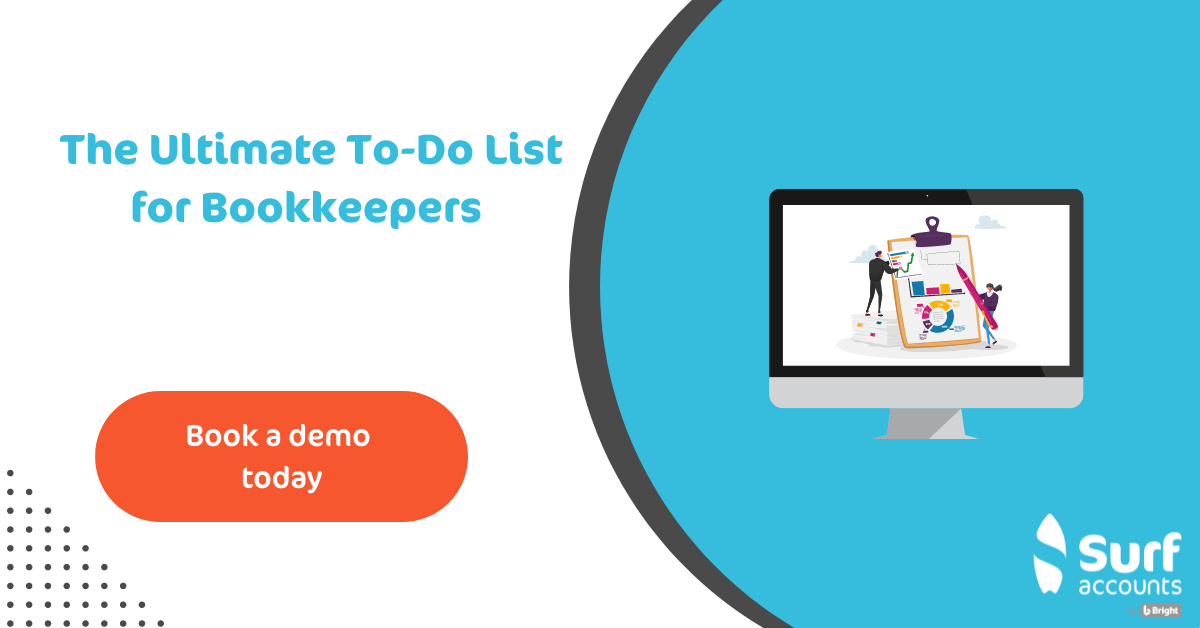The Ultimate To-Do List for Bookkeepers
While accountants typically review financial statements, bookkeepers track and measure a company’s financial transactions, such as sales, payroll, and payment of bills, to name a few. In the past, bookkeepers would typically record this information manually, but thanks to bookkeeping software, such as Surf Accounts, bookkeepers’ lives have been made much easier. Surf Accounts is a cloud-based accounting and CRM software that is aimed at small to medium sized businesses. The accounting software can help bookkeepers by streamlining processes and automating previously manual heavy tasks

As it is a cloud-based software, Surf Accounts allows you to work from anywhere, at any time, and from any device. This makes managing your clients’ financial records easier and will save you time for more important tasks.
Prepare Financial Statements
Most bookkeepers will prepare businesses’ financial statements. These statements are broken down into three types:
- Profit and Loss
- Balance sheet
- Cash flow
Profit and Loss
The profit and loss report summarises a business’s total revenue, expenses, and costs within a specific period. This is an important statement as it is needed for year-end tax reviews.
Balance Sheet
A balance sheet statement will provide you with an overview of your clients’ businesses’ assets, liabilities and shareholder equities, if any.
Cash Flow
The cash flow statement provides you with information on the cash coming in and going out of your clients’ businesses during a specific time period.
Creating financial statements can be time consuming, however, with Surf Accounts’ financial reports and dashboards feature, you can generate the statements mentioned above and much more, with just a few clicks. Ultimately, this will help you keep your clients’ businesses organised and everything in the same place.
Handle Accounts
Bookkeepers manage both accounts receivable and accounts payable. Accounts receivable is the amount of money owed to your clients’ business for goods or services which have been invoiced but have not yet been paid for by the customer. The bookkeeper’s role here is to create invoices, send them to customers, provide statements and help with collecting money owed from customers.
Accounts payable is the opposite to accounts receivable, this is the money owed by your clients’ business to its suppliers for their goods or services. In this circumstance, bookkeepers will note payment deadlines from each supplier and make sure payments are made on time. Making sure accounts payable are managed properly is very important for maintaining the relationship between your client and their suppliers.
Surf Accounts can help bookkeepers keep track of money owed to your clients and money your clients owe. From the main dashboard in Surf Accounts you can view key figures such as debtor information and your clients’ current bank position. Dashboards also contain a table where you can view aged debtors
Reconcile Your Bank Accounts
Bank reconciliation is one of the most important tasks for bookkeepers and is usually done on a monthly or bi-monthly basis. This is the process of comparing your business accounts against your bank statements and should be the last thing you do after entering your purchase invoices, sales invoices, payments and receipts. Ultimately, the two figures must add up and equal each other, if they do not agree, there is an issue that must be figured out. It is important to reconcile your accounts regularly to avoid things such as overdraft fees, fraudulent charges or incorrect transactions.
Bookkeeping software, Surf Accounts, allows you to import your bank statements files directly into the software. In turn, this will save time on postings and make bank reconciliations easier. This means that the software will automatically compare your bank transactions with your transactions in Surf Accounts. This eliminates the need to go back and forth comparing your bank statements with Surf Accounts, allowing you to reconcile large amounts of transactions quickly.
Process Payroll
Although a bookkeeper’s main role is to keep a record of the financial status of their clients’ businesses, they also often help with managing payroll. They may use payroll software to process payroll and then import the data into their accounting software.
Earlier this year, Surf Accounts announced their new integration with BrightPay Payroll Software. This integration allows bookkeepers to send the payroll journal directly from BrightPay to Surf Accounts, in just a few clicks. This integration can save you time and improve your efficiency.
In recent years, cloud backup is probably one of the most important tools for bookkeepers. Essentially, cloud back up will store your data onto a safe and secure server. As previously mentioned, the integration between BrightPay and Surf Accounts, is safely secured by Microsoft Azure servers. These servers are one of the most reliable in the world and are trusted by 95% of Fortune 500 companies. Therefore, any data imported into either software will be safe, secure and will be readily available whenever you need it.
As shown, a bookkeeper’s role is different to the role of an accountant, but there are many similarities. With advancement in bookkeeping software, bookkeepers are able to prepare financial statements, reconcile your bank, process payroll and handle both AR and AP accounts. Traditionally, bookkeepers would have to do this manually, but with payroll and bookkeeping software such as Surf Accounts and BrightPay, the role of bookkeeping has never been easier.
Related articles:
